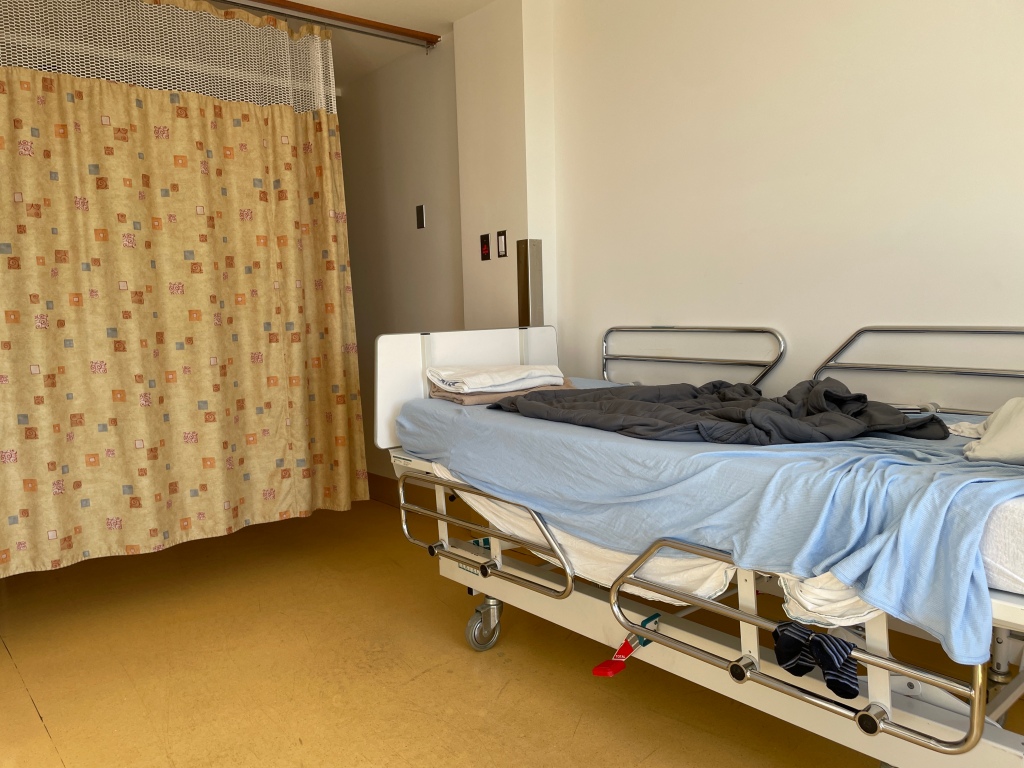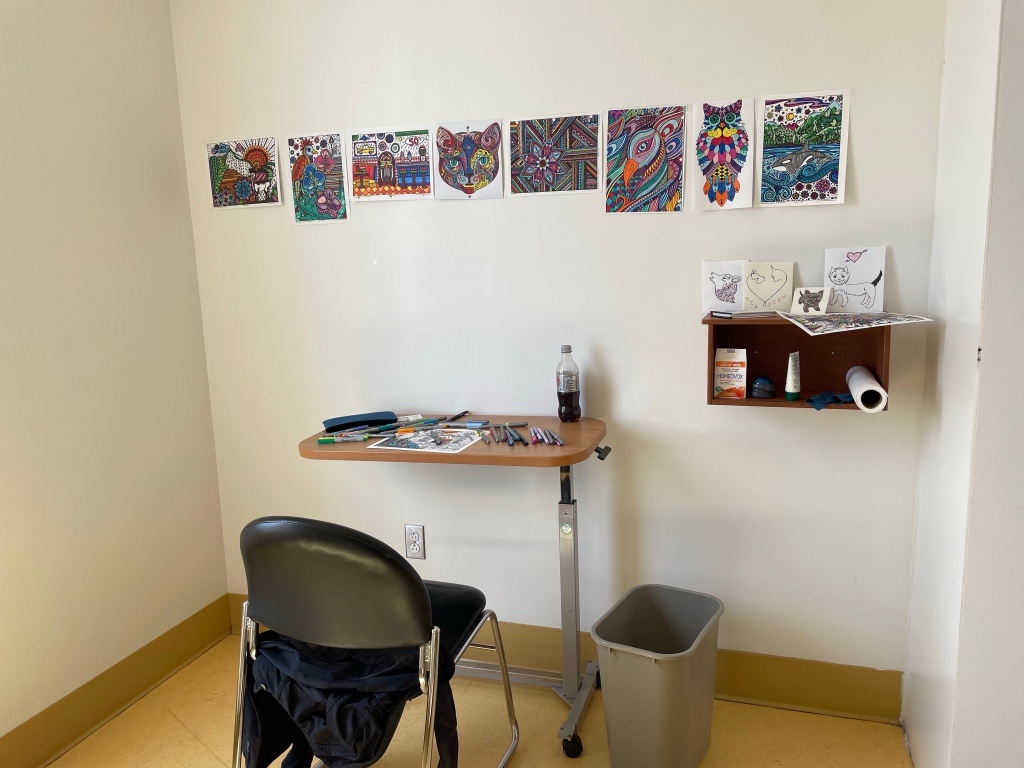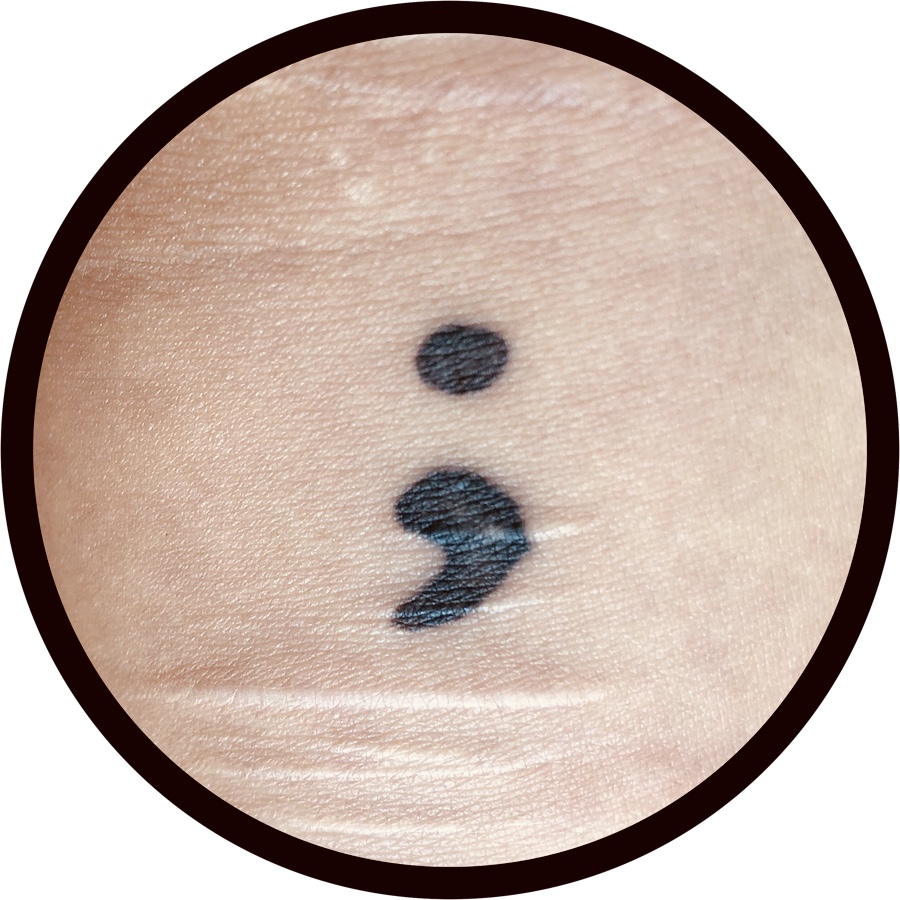Hi! I’m back in the ward and it’s kind of reassuring in a way. I was really looking forward to going home and it was still great to be with my parents and Aaron, but I had a bit of a hard time. I felt kind of lost, out of it and…it’s actually difficult to explain. I felt off… I guess I’m not as ready as I would like. Why should I assume though that about a month is enough to fix the past 2 months much less the past 7 years? That wouldn’t be realistic.
By the way right before I left to go home on Saturday they told me I’d be changing room. (This is the third room now.) Here’s what it looks like.


Unfortunately I’m not alone this time. It’s a larger room that’s divided with a curtain and there are two beds. Before I get into how THAT’S been going, allow me to introduce today’s topic. An Insider Account of What Really Goes on in a Psych Ward… and How to survive it! I’ve written about psych wards and crisis centres before but before you think this blog is redundant, let me explain. I’ve covered differences, rules, how things work, etc. If you missed out you can find the article HERE. What I hope to share today is different; I’m talking about the inner workings, the politics; in other words – stuff you won’t find in a welcome packet! Let’s get into the nitty gritty that falls between the cracks.
Patient Politics
The Golden Rule: Make a shiv the first chance you get and attack the biggest, meanest looking person in the ward. Wait no sorry, that’s for my prison blog. Moving on! (Do. Not. Do. This!)
Rule #1: Be kind and polite, but don’t open up too much. Keep anything personal to yourself and set your boundaries early on. Its better to remain a quiet mystery than to gush your life’s secrets.
• You can form inter-patient relations but make sure they’re superficial. Its not the time nor the place for anything more than temporary aquiantances. Everyone is vulnerable making unhealthy dynamics too easy to develop.
• The goal in a psych ward is to heal and relax. Part of this means you require a healthy environment. The best chance of getting this is to be largely left alone. Don’t worry about patients liking you – you just don’t want to be disliked.
• Speaking of being liked or disliked, either can happen. Someone might think they like you romantically, in which case declining tactfully is the ideal approach. You might alternatively be disliked and not know why. It’s best to avoid confrontation and escalation by keeping your distance. If trouble/conflict reaches a certain level, it’s best to speak with the staff privately. Ideally it won’t come to this, but sometimes there’s no alternative. Seeking help can be smart because you never know what might trigger another patient. Voice yourself privately so the person doesn’t know. It sounds like backstabbing but in reality it can help preserve the other’s feelings.) Going back to my new roommate, I had to use these tactics. She’s an elderly woman with dementia and I have a lot of empathy for her. Unfortunately though, it poses some problems for me. She walks into my side of the room, slams the doors, talks and swears to herself and the staff and most annoying of all is the flushing! This woman will go to the bathroom just to flush the toilet between 5 and 12 times in a row. The toilets here are what I like to call anti-clog. The water pressure is such that the toilet flushing is incredible loud. Imagine trying to write meditate or do anything quietly but you have the toilet running in the background for five minutes at a time every few minutes. NOT RESTFUL! What did I do? I told the nurses and asked them to lock our bathroom door. It’s not always locked but it helps. They’re also going to find me a different room when one becomes available. Thank goodness!
• Display common courtesy with things that are shared amongst patients. Don’t hog the colouring pencils, remote, etc. At the same time. remember that you are as entitled to using these things as anyone else is. Don’t become a human rug!
• Try not to bring too many valuables. Limit it to necessities and be careful with them. The less people think you have, the better. In other words try to be subtle with your belongings and be careful of where you store them.
• Ah. Cigarettes and psych wards are like chocolate and peanut butter. Here’s a piece of advice though: Be very judicious about giving one out. It doesn’t take long for a person to become ‘the cigarette dispensary’ of the ward. Take it from me!
• Finally, don’t bend over to pick up to soap. Oh…nope – wrong blog again!
Staff Politics
In my humble opinion, the staff can be more difficult to work with than the patients! It’s unfortunate, but the reality is that, to a certain degree, they need to be played. I mean this with the strictest of guidelines, which we’ll explore together below.
Rule #1: Its’ the Hunger Games and your survival relies on the audience -cough- I mean staff, LIKING you. Not as you expected? Katniss didn’t either. References aside, I’m not kidding. The quality of your stay is largely dependent on the staff. How the staff treats you is largely dependent on your behaviour.
For this I made a do’s and don’ts list; it’s not exhaustive but its a sure leg up!
Do:
• Communicate your needs and wants politely.
• Comply with their ‘demands’. I know we don’t normally negotiate with terrorists, but…I’M KIDDING! Just kidding! I MAY have had a few too many negative experiences. Does it show? Ok sorry, moving on. They have certain protocols and some are likely to annoy the crap out of you. Despite this, please be a good girl, boy or other. In all fairness, the staff does have to handle a lot of stuff that can’t be easy. If you show yourself to be a compliant and patient patient, things will go a lot smoother. Don’t be difficult and you’ll already be winning!
• Understand and accept the way the privilege system works. Prove that you’re safe and abiding by the rules and you’ll gain privileges like showers, clothing, full-time access to belongings, outings outside, more privacy, etc.
• You might encounter many nurses and proposes but try to remember and use their names.
• DO ABSOLUTELY tell the staff when you’re not feeling well!
Don’ts:
• Don’t go behind the staff’s backs’ by hurting yourself or doing something against the rules.
• Don’t raise your voice or swear at the staff or patients.
• Don’t punch, kick, slam or throw anything.
• Don’t abuse of your privileges by exceeding time limits or going off the grounds for example.
• Don’t try to get the staff off book. By this I mean their protocol. Learn to work within their existing framework; it’s the only way to get what you want.
Let me tell you something… there’s a code white going on right as I write this with a patient and nurse screaming at each other. We’re not allowed out of our rooms because security is probably here now and he’s the type who could get physical. I think they’re going to sedate him. It’s really bad…this makes me nervous. The point I’d like to make is that he’s having a really hard time and not earning any privileges because his behaviour is the perfect example of what NOT to do. No matter how frustrated we are, it’s important to keep our cool.
General Advice
• If you’re court mandated by 2 psychiatrists to stay, think carefully about whether or not to fight it in court. You might win and get the guard lifted, but if you lose, you can’t gain privileges to go outside. If you accept to stay, it’s easier to get things in your favour. First of all you can’t be court mandated if you accept to stay, which means the guard will be lifted. This means you’ll be allowed outings, you’ll probably stay less long and the general experience will be more pleasant. Cooperation goes a long way! 
• When a code white happens, stay away from the commotion. The staff will send you back to your room anyway but it’s best to leave before things escalate too much. Stay inside, close the door and remain calm despite the yelling and other assorted sounds. When the code white has ended, try not to be too demanding of the nurses. They have a lot of paperwork to do and get very stressed. Still, if something is urgent, DO inform them!
• While we’re at it, let’s talk about the codes.
Code black: Bomb threat
Code blue: Adult cardiac or respiratory arrest, loss of consciousness
Code pink: Pediatric cardiac or respiratory arrest, loss of consciousness
Code brown: Hazardous spill within the facility
Code green: Evacuation
Code orange: External disaster
Code red: Fire
Code white: Violent patient, sometimes a runaway
Code yellow: Missing or lost patient
• Gear up for when you meet your psychiatrist. No matter how you’re feeling, that’s when it’s most important to communicate to the best of your ability. Don’t hold back…the more you share, the more you have to work with!
• Remember that you’re always under observation. The staff is evaluating you and will take your demeanour and behaviour into consideration when it comes to any decisions. Préposés report to nurses and nurses report to psychiatrists.
• Try not to get mad if a préposé or nurse doesn’t allow you a certain accommodation or request. Often it’s not in their hands. It’s best to wait and speak to the psychiatrist who will make the decision rather than to complain and reduce your own chance of success.
• If you’re a smoker, don’t expect to go outside right away. Patches and gum are offered though so ensure that you tell your nurse as soon as possible so the doctor will prescribe them for you.
• Expect to have a lot of waiting around. That’s why we’re called patients. It’s not fun, but if you lower your expectations, the wait can be easier to handle.
• Close the door of your room when you leave; it’s less tempting for someone to go in and makes it a little more obvious to the staff if someone does.
• You won’t always be allowed your phone right away but you’re sure to want to keep contact with the outside. My advice? Write down important phone numbers so you can use the facility phone. (Who remembers numbers these days?!) It doesn’t hurt to bring change, either.
• For the awkward early stage where you’re not always allowed clothing, ask for two hospital gowns so you can cover that ‘un-coverable butt flap’.
• If you’re about to check in to a psych ward and have the luxury of packing things and thinking ahead, (because you didn’t hurt yourself or get brought in by cops), this is for you:
– Take a shower, brush your teeth, shave if you’re a woman and put on clean socks and underwear. You don’t know when the next time will be.
– Pack your chargers, adapters (dual adapters are ideal), underwear, socks, shoes without laces or ones with easily removable laces, small bottles of shampoo and conditioner, deodorant, a hairbrush (I don’t have that problem – seriously, shave your head, it’s the best!), comfortable clothes without drawstrings and that don’t require a belt, stuff to occupy yourself with (colouring supplies, books, magazines, puzzles, whatever…), a bottle of water, easily storable snacks, a shammy if you wear glasses, dentures and/or contact lenses with paraphernalia if required, and anything else you can think of.
– Label everything you bring with your name!
Well, that’s all I can think of right now…I think that’s a pretty good start for you!

